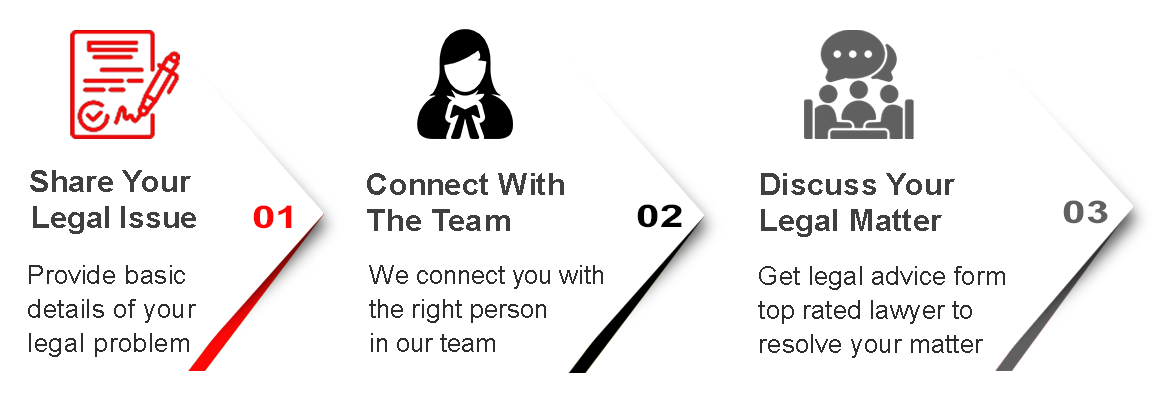Legal Help for Civil Disputes
Talk to a Verified Lawyer for Breach of Contract, Compensation Claims & Civil Litigation.
What is Civil Law?
Civil law is concept of law that deals with the clashes between individuals, organizations or between individual and organization. Dislike criminal law, it do not focus on inflicting punishment to wrongdoer, rather it resolves the disputes by providing compensation to victim from wrongdoer. Basically, the main motive of civil law is to provide fair and equal justice during trials. It addresses wide range of issues including:
Contract and Agreements:
An agreement is mutual comprehension between one or more parties with respect to their rights and responsibilities to be followed. It can be made informally and may not be legally binding but the contract is made in formal manner and they are legally binding. For this reason, it is said that all contract are agreement but all agreements are not considered as contracts.
Tort law:
It is related to civil wrong, in which an individual suffers from significant harm by the actions of other person. It includes negligence, strict liability, defamation and nuisance. The victim can take legal action against wrongdoer and is entitled to compensation.
Inheritance law:
It states the procedure and guidelines to be followed while transferring the assets of a deceased person to the legal heirs. This law is based on the presence of will and nature of asset. Basically, this law ensures a fair transfer of property to legal heirs. It resolves the disputes between two parties related to ownership of property.
Null and Void Marriage:
When family court declares that the marriage is legally not valid and never existed, is termed as null and void marriage. The marriage become null and void when there is no consent of one party, partners has not attained the legal age of marriage, if one partner performs bigamy and there is sapinda relationship between partners.
Insurance law:
Insurance law governs the relationship between insurance company and their policyholders and states the rights and responsibility of both the party. It ensures that insurance company fulfills the obligations of policyholders. This law is governed by Insurance Act, 1938 which ensures the fair and transparent operations between both the parties. It resolves the disputes over insurance claims.
Employment law:
This law governs the relationship between employee and an employer and ensures the fair workplace environment. It protect the rights of an employee and helps to resolve the dispute relates to illegal termination and discrimination.
Consumer protection:
The consumer protection law is made to protect the rights of consumer against unfair business practices and unethical selling methods. The consumer can file complaint with the consumer forum which orders the supplier to compensate the victim.
Legal Notices:
A legal notice is considered to be the first step to resolve any issue and it is made before taking any legal action against wrongdoer. It is a best way to settle down the matter in an amicable way but it is essential to consult an expert lawyer before sending a legal notice as he will guide you or drafts a legal notice on your behalf to ensure the accuracy and will relate to the laws.
Intimation Letters:
An intimation letter is different from legal notice as it is just the official written communication which is send to the wrongdoer to notify him about the action and decision. It also covers all the claims and reliefs made by the victim for his loss.
Apart from these laws several others aspects of civil law includes bankruptcy law, commercial law, and civil procedure. Each factor requires a thorough analysis and an expert legal assistance to navigate the complexities of issues related to civil law. Lead India Law ensures best course of action and provide a lawyer who will resolve the matter in efficient and effective way.
Popular Lawyers
View allOur Client Testimonials
Frequently Asked Questions (FAQs)
Q. How civil law differs from criminal law?
Ans. Civil law resolves the disputes between individuals and organizations, which compensate the victim by wrongdoer. On other hand criminal law deals with offences against society and punishes the criminal with imprisonment, fine or both.
Q. What does tort law includes?
Ans. Tort law covers various aspect of civil wrong like negligence, defamation, liability, deterrence and protection to victim.
Q. How civil law handles property disputes?
Ans. Civil law handles property disputes by resolving the issues related to inheritance, ownership, and tenancy. It safeguards the rights and interest of an individual by protecting their property.
Q. What is procedure to file a civil suit in court of law?
Ans. The civil suit is filed by drafting a petition and submitting it in court of law with the help of an expert lawyer. The court will issue notice or summons against defendant, who must respond to it. Both the parties have to attend all the hearings which may include arguments and evidences, till the court order.
Q. Why it is essential to consult an expert lawyer to send legal notice?
Ans. It will be best if you consult an expert lawyer, as he will draft the notice on your behalf more accurately, legally and will increase the chance to resolve the issue without going to court.
Q. How insurance laws protect policy holders?
Ans. Insurance law protects the rights of policy holders that insurance company has obliged to do so. It helps the policy holders to get compensation if company fails to fulfill the duty and responsibility.
Q. What legal action can be taken against defamation?
Ans. If you are a victim of defamation then firstly you should try to resolve the matter in an amicable way, if still the matter remains unresolved then you may consider sending a legal notice. If there is no response of legal notice then you may escalate the matter to court by filing civil suit.
How Lead India can help you?

24x7 Help
If we fall short of your expectation in any way, let us know
Payment Trust
All refunds come with no questions asked guarantee



